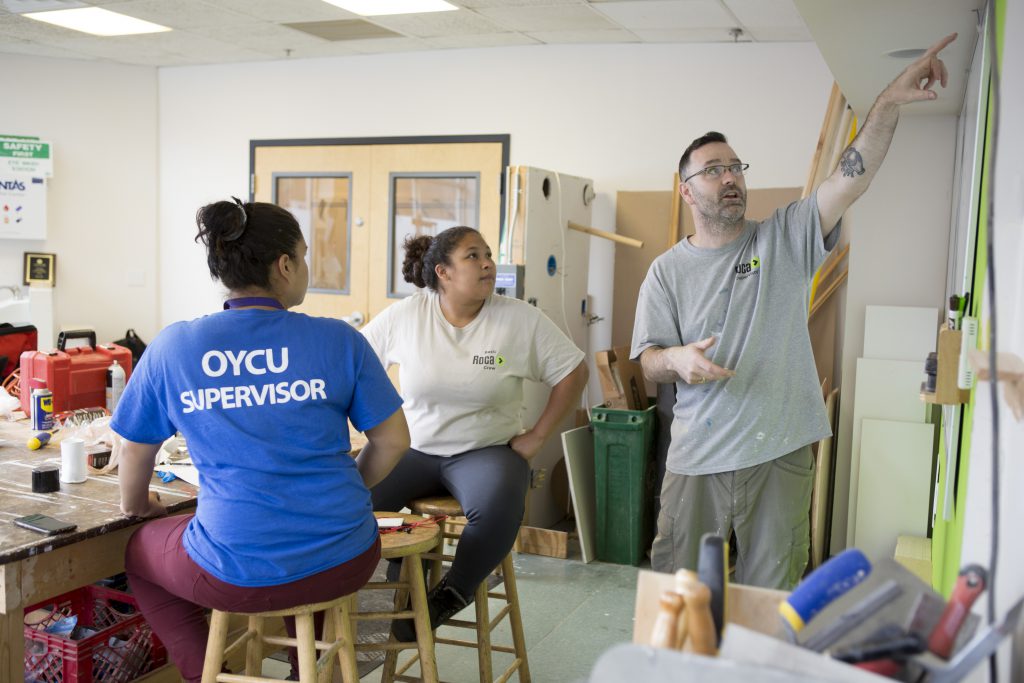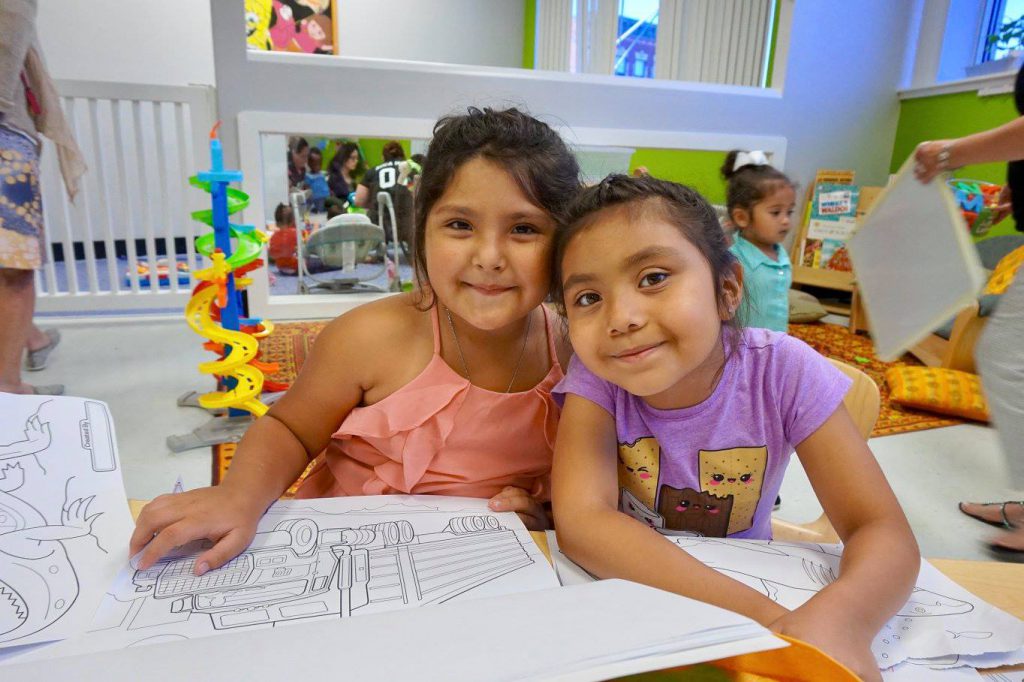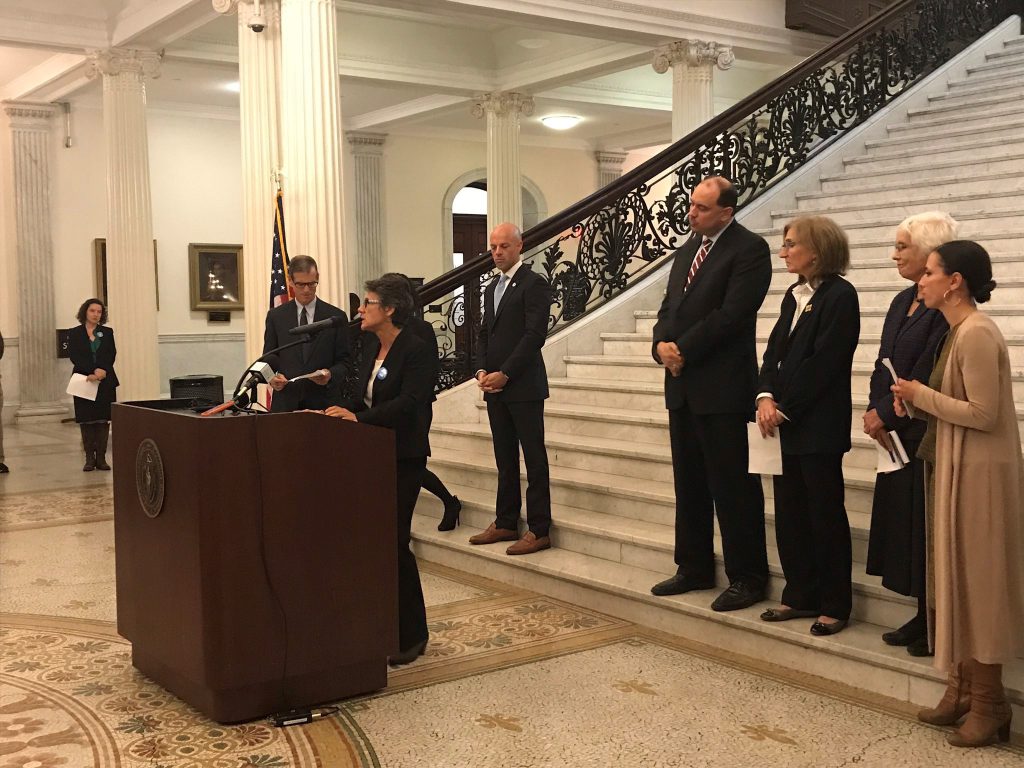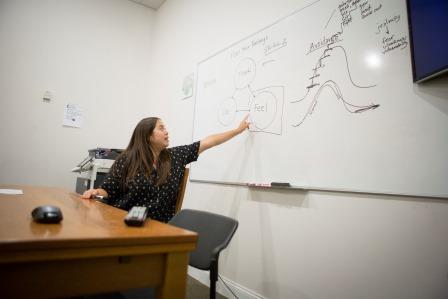Issue 6 | Fall 2017
Dear Roca friends,
If we want to get better in helping young people succeed, we have to study our own data. At this time of the year, we’re wrapping up the analysis of FY17 data, and indeed, there’s a lot to study.
What’s already clear is that the numbers match what we’ve been hearing from our youth workers for a while: sadly, the young people we see are facing more risks than before. With more trauma, more fentanyl around them, and increased availability of guns, it seems that the risks are intensifying. 24/7 presence in social media takes its toll also and puts them in a constant state of hypervigilance – they feel like they need to look over their shoulder, even in their own bedroom.
What does that mean for our work?
This is where the data becomes particularly helpful. We are using data to study how we can improve our young people’s chances of getting a job and holding it over time. Together with our partners, we look at arrest data, violations of probation, and incarceration, and analyze what that tells us about “what works” for young people. And with support from the Bill & Melinda Gates Foundation, we partner with the City University of New York and our evaluator Abt Associates, to study this new territory of what we call, for lack of better words, “elevated risk”.
Most importantly, we continue to focus all our work on the highest risk young people.
Dig into FY17 data on our young men and young mothers programs. Learn more about our model. Stay connected.
Warm regards,
Molly Baldwin, Founder and CEO

Harvard and NIJ’s Paper about Roca
Here’s your chance to dive deep into Roca’s Intervention Model: a new paper from the Executive Session on Community Corrections – a joint initiative of Harvard Kennedy School and the National Institute of Justice – takes a close look at Roca.
The paper goes beyond describing the Roca Model: It explains how Roca aligned its work with the evidence-based practices of community corrections, what theories informed this process, and offers some lessons for the field.
The executive session continues to be a wonderful resource for exploring new fronts in community corrections. Learn more about young adults in the criminal justice system, the benefits of reducing probation population, and much more here.

Business @ Roca: Ali’s Summer Experience
“An intentional approach to business has the power to serve and support those who need it most,” writes Ali Weiner, a REDF Farber Intern who spent her summer at Roca, and we couldn’t agree more.
Last summer, Roca was honored to host Ali for 10 week internship. In the middle of a joint graduate program of Harvard’s Kennedy School of Government and Stanford’s Graduate School of Business, Ali took the past summer to test how various business approaches can advance the lives of the highest risk young people.
It was a busy summer. “We looked at more than a dozen industries, modeled out the dynamics of a few, and made a decision to scale up work in the deconstruction market, signing a contract with a new partner that will create transitional employment jobs for our young people and solve a pressing business need of the partners,” Ali shares.
Thanks Ali and thanks REDF for the privilege to partner with you!
Read more about Ali’s experience here.

Chelsea: Winners of the RWJF Culture of Health Prize
Chelsea won! After a multi-month long process of applications, interviews, and site visits, the City of Chelsea was named the 2017 Robert Wood Johnson Foundation Culture of Health Prize Winner. This is a huge boost for Chelsea as it has worked tirelessly in recent history to make the city healthier and safer for all of its residents.
Roca was featured alongside Chelsea partner organizations such as GreenRoots, Chelsea Collaborative, The Neighborhood Developers, Chelsea Prospers, Chelsea PD, MGH Chelsea and others in a recent RWJF posting about the winners. They wrote that all of these partnerships “…exemplify how Chelsea works: All together.” We agree!
The article focuses on three important areas of the City of Chelsea’s work toward healthy living: environmental restoration, social justice, and health education. The Robert Wood Johnson Foundation wrote about the city that, “to address such a wide gamut of issues, they’re changing policy through activism, forward-thinking policies like an aggressive trans-fat ban, sanctuary city protections for undocumented immigrants, and the inclusion of affordable housing in new developments. Though everyone may not agree on everything, there is strong coordination here between city government, health providers, nonprofits, and businesses.”
Roca was featured alongside the Chelsea Hub and many other Roca partners, including the Chelsea Police Department. Chief of Police Brian Kyes commented that, “law enforcement is 10 percent of what we do. The community sets the agenda for us to do our jobs. We listen to their concerns and work together.”
Congratulations to Chelsea and all our local partners!
Read the full story from RWJF here.

our new Playroom
We have a brand new playroom for the children of our Young Mothers Program! Last July, we cut the ribbon on a larger and safer playroom for children – a place where kids can play while their mothers take classes with Roca.
Balancing work and family life is hard for everyone. At Roca, we are honored to meet every day young mothers who struggle to navigate this balance, and we are amazed by their resilience and ability to make things work despite immense challenges. A safe playroom for the children of Roca’s young mothers is just one small step in helping them gain the skills they need to lead safe, stable, and hopeful lives.
“Childcare is always a hurdle for our young mothers, and this new playroom will help provide that service for this special group of young women so they can attend their classes with peace of mind. At Roca, young mothers are changing their lives and make a future for their children every day. This playroom is one step closer to helping us achieve those goals,” said Molly Baldwin, founder and CEO of Roca.
The new playroom was made possible thanks to the help of Marjorie Bride and Terry McEnany. The creative and safe design was done by Caroline Blackman. Thank you for your continued support!

A major step toward criminal justice reform
This week, the Massachusetts Senate is going to vote on a major criminal justice bill that offers a comprehensive and bold approach to criminal justice reform. We are particularly excited that the proposed bill raises the age of the juvenile court to 19, and starts a longer study of further raising the age.
We believe the time is right for true changes in our justice system. And we know our leaders at the House, the Senate, and the Governor’s office understand that as well.
Working with over 1,000 young people across Massachusetts annually, we know how our current laws impact their lives every day. We know that the current approach to young people in the justice system is simply ineffective and unsafe. And we also know better options exist.
Raising the age is a smart approach to public safety, offering an opportunity to enhance public safety, reduce recidivism, reduce public spending, and improve outcomes for young people.
Read Roca’s testimony on raising the age and learn more here.

CBT and other new videos from roca
“I didn’t know what CBT was before I came to Roca,” says Tyleek. Do you? In a new video, Tyleek and other Roca participants and staff explain what CBT, or Cognitive Behavioral Theory, is all about.
CBT is a tool for understanding the relationship between our thoughts, behaviors, and emotions. In collaboration with Community Psychiatry PRIDE Clinic at Massachusetts General Hospital, we’ve developed a CBT curriculum specifically for our young people. After several pilots and in the midst of an implementation study, we already feel we changed the game for ourselves and our young people.
“I felt like they wouldn’t take to it, they wouldn’t accept it,” says Michael Bonds, a Roca Boston youth worker. “But believe it or not, they’ve accepted it and gravitated towards it.”
Roca’s CBT curriculum consists of 10 skills, deliverable in classrooms, in the car, on the street, or wherever the need arises, through short sessions of up to 30-45 minutes. But it’s much more than a curriculum – it’s a new approach to youth work. “It’s definitely a game changer for youth workers, because now you have a tool that you can use to have those hard conversations,” says Tha, a Roca Boston Assistant Director.
Check out the full CBT video on our YouTube page, along with the other new videos on Relentless Outreach, Redefining Police Partnerships, and Transformational Relationships. Share with your family, friends, and colleagues, and be sure to tag @RocaInc on Twitter and Facebook when you do!

Roca extends a special thank you to some generous donors for giving in this quarter!*
- Amelia Peabody Foundation
City of Boston, Mayor’s Office of Workforce Development (CDBG)
Laura and John Arnold Foundation
Liberty Mutual Foundation
MA Department of Children and Families, Young Parent Support Program
MA Department of Public Health, Pregnant and Parenting Teens Initiative
Nordblom Family Foundation
Ray Solem Foundation
The Irene E. and George A. Davis Foundation
Yawkey Foundation
*All this in addition to the generous foundation, individual, and corporate support over the last quarter.


